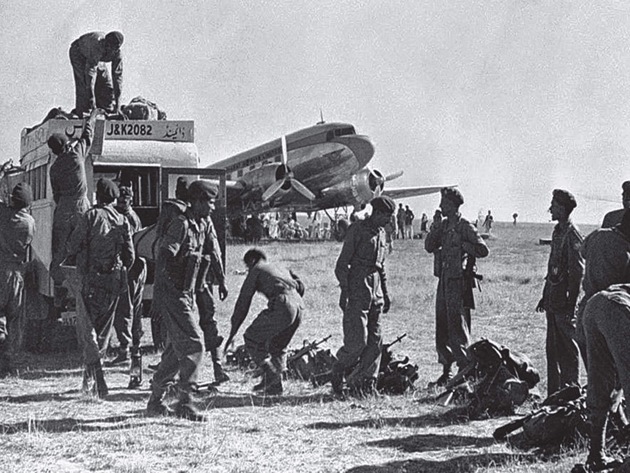Pak role in Kashmir violence, terror and killings since 1947 to be highlighted on Oct 22
After the nullification of Article 370 and formation of Jammu and Kashmir as Union territory on August 5, 2019, the day will see demonstrations in Jammu and Srinagar as the UT will be under security dragnet.
India will spotlight Pakistan’s role in instigating violence and terror in Kashmir and the destruction of its culture on October 22, a day when Jammu and Kashmir was attacked in 1947 after which a big part of the erstwhile princely state was occupied by Pakistan and thousands of Hindus and Sikhs had to migrate to the Indian side, according to officials familiar with the development.

According to senior officials, the day will be observed to protest against Pakistan, who used the tribal militia and army to wreak rape and mayhem in Kashmir in 1947, with protests in the Valley and in Delhi. After the nullification of Article 370 and formation of Jammu and Kashmir as Union territory on August 5, 2019, the day will see demonstrations in Jammu and Srinagar as the UT will be under security dragnet.
Every year, October 22 is also observed as Black Day by Pakistan occupied Kashmir (PoK) refugees in India. It was on this day that Pakistan had launched Operation Gulmarg to attack Jammu and Kashmir and which left thousands of people dead. Operation Gulmarg was conceived under the command of Major General Akbar Khan, who has spoken about this in a book and admits to Pakistan’s role in the conflicts in the Kashmir Valley.
“On October 26 (1947), the Pakistani forces captured Baramula where only 3,000 survived out of 14,000. The troops were now only 35 miles from Srinagar when the Maharaja (Hari Singh) sent his papers of accession to Delhi asking for help,” Khan has written in the recently-re-published book, Raiders in Kashmir.
Khan has said in his book, as he gives out minute details of Pakistan’s aggression in Kashmir, that the plan was hatched and formulated in Lahore and Rawalpindi. He has said he was asked by Mian Iftikharuddin, then a leader in the ruling Muslim League, at the beginning of September 1947 to prepare a plan to take over Kashmir. “Ultimately, I wrote a plan under the title of “Armed Revolt inside Kashmir”. As open interference or aggression by Pakistan was obviously undesirable, it was proposed that our efforts should be concentrated upon strengthening the Kashmiris themselves internally -- and at the same time taking steps to prevent the arrival of armed civilians or military assistance from India into Kashmir,” Khan said.
“On October 22, the operation began with Pakistani forces crossing the border and attacking Muzaffarabad and Domel on October 24 from where the Dogra troops had to withdraw. The next day these troops moved forward on the Srinagar road and again took on the Dogras at Uri... On October 27, India intervened and sent troops to Kashmir,” he has written.
Khan also writes in Raiders in Kashmir how the Pakistani army had worked with the tribal forces in various incursions in Kashmir. He had “rushed back to Pindi to ensure that the tribesmen received their ammunition in time” after being appointed as the military adviser to the prime minister on October 28, 1947.
About 11,000 residents of Baramulla were killed on October 26, 1947, alone, and the Mohra power station that supplied electricity to Srinagar was destroyed in the attack. “The raiders came to our land, massacred thousands of people -- mostly Hindus and Sikhs, but Muslims, too -- abducted thousands of girls, Hindus, Sikhs and Muslims alike, looted our property and almost reached the gates of our summer capital, Srinagar,” Sheikh Abdullah, the first prime minister of J-K, described the invasion at the UN in 1948.
Maharaja Hari Singh appealed to India for help in a letter dated October 26, 1947. “With the conditions obtaining at present in my state and to the great emergency of the situation as it exists, I have no option but to ask for help from the Indian Dominion. Naturally, they cannot send the help asked for without my state acceding to the Domination of India. I have accordingly decided to do so and I attach the Instrument of Accession for acceptance by your government,” he wrote.
European Foundation for South Asian Studies (EFSAS), a think-tank, has said the intervening night of October 21-22, 1947, was the darkest day in the history of Jammu and Kashmir when Operation Gulmarg was launched and that Pakistan’s template has remained the same till date.
“Pakistan has perpetuated the myth that the tribal raiders were liberators and came to Kashmir to fulfil their religious obligation of jihad because Muslims were being killed in Jammu in communal riots. However, the reality was that it was not as if Muslims had been spared (by them),” it has said.
Get Current Updates on India News, Election 2024 along with Latest News and Top Headlines from India and around the world.



